|
The Going Rural Health Newsletter |
| |
|
Edition 18 - November 2021 |
| |
|
Welcome to Going Rural Health News! Going Rural Health News is the publication of new and relevant information about all things related to rural clinical placements, education and rural health, from the Going Rural Health team. Team members are located in Ballarat, Shepparton and Wangaratta.
With vaccination rates soaring, Victorians are now enjoying some much deserved freedoms. Rural areas are keeping up with or surging ahead of vaccination rates in metropolitan areas, but we still advise caution, as some vulnerable populations that are more prevalent in rural areas - such as aged and Aboriginal and/or Torres Strait Islander people - do not always have the same amount of vaccination protection as the rest of the community.
We encourage everyone to continue to stay safe - socially distance, wear a mask when required, wash your hands, follow any restrictions, and get vaccinated when you can. It's the best way to protect our vulnerable community members and not overload our healthcare frontline workers.
The Going Rural Health team |
| |
|
Going Rural Health student support
Student Event - Fright Night!
The University of Melbourne 6th Annual Ngar-wu Wanyarra Aboriginal & Torres Strait Islander Health Conference
Going Rural Health Extended Rural Immersion Clinic (ERIC)
Going Rural Health Mentoring Program
The Going Rural Health Blog
Goulburn Valley Regional Training Hub
Going Rural Health Education & University of Melbourne Department of Rural Health Webinars
External Education & Resources
Pharmacy - RPLO
Going Rural Health and University Department of Rural Health (UDRH) Research
Going Rural Health Website |
| |
Going Rural Health Student Support | |
|
Going Rural Health supports students to complete rural clinical placements. Support includes financial assistance, subsidised accommodation in selected areas, education, mentoring support, student activities, & cultural training. For financial assistance, eligible students may only receive EITHER subsidised accommodation at University of Melbourne owned housing (where available, subject to availability) OR a financial payment for their placement (not both). Financial payment is calculated per day of attendance at placement.
More information on the Going Rural Health Student Support Scheme, including how to apply & eligibility criteria, is available HERE.
As always, we are trying to ensure that students get the best placement experience possible. Please help us to do this by directing students to complete our Student Placement Survey. It is a short online survey that should only take students 10-15 minutes to complete. |
| |
|
Student Event - Fright Night! |
| |
|
Going Rural Health, with the University of Melbourne Rural Clinical School and Goulburn Valley Regional Training Hub, are supporting an at-home student event for health students at Halloween: Fright Night!
Students are provided with a movie pack consisting of:
- a couple of (copyright free, from the public domain) old horror movies
- movie food (popcorn, lollies)
- coffee and/or hot chocolate (or alternative for those with special dietary requirements)
More than 60 students have registered for the event. Registrations have now closed, but the team are hoping this sort of event will be part of the student experience every year. |
| |
|
6th Annual Ngar-wu Wanyarra Aboriginal & Torres Strait Islander Health Conference |
| |
|
The Department of Rural Health, The University of Melbourne recently held its 6th Annual Ngar-wu Wanyarra Aboriginal & Torres Strait Islander Health Conference. We had a record number of conference delegates with 275 registrations. We received presentations from Aboriginal &/or Torres Strait Islander people who provided their presentations addressing key findings and current health issues facing the Aboriginal & Torres Strait Islander community.
Our keynote presenter was multi-award winning broadcaster and journalist Mr Stan Grant who shared the difficulties he faced growing up and an insight into the many challenges the Aboriginal community face. Our MC for our conference was Ms Gwenda Freeman who is a Yorta Yorta woman and lecturer in Aboriginal Health Education at the Department of Rural Health. Gwenda said that the health sector needs more Aboriginal and Torres Strait Islander Australians to be working as doctors, nurses, health workers, administrators, and counsellors – to at least reflect the population percentages in each location. “Health research and services need to involve and be owned by Aboriginal people,” Ms Freeman said. “Our participation is of direct value to the community.”
Ms Freeman will be presenting on ‘A rural pathway to university Studies in Aboriginal health’ which will provide a pathway for Aboriginal and Torres Strait Islander people to undertake the Master of Public Health degree, opening possibilities for input at every level of the health sector. Professor Lisa Bourke from the Department of Rural Health said the conference provides a forum for the presentation of cutting-edge program initiatives and research findings in Aboriginal health and wellbeing by health professionals from the community. “Health experts from around Australia will offer their insights into how community-led solutions, underpinned by cultural approaches to Aboriginal health and wellbeing, can transform health practices,” Professor Bourke said.
The conference has become an annual event and offers an opportunity for sharing information and connecting people who are committed to Aboriginal and Torres Strait Islander health practice and research. The conference title, Ngar-wu Wanyarra or Listen Act, draws on the aspects of hearing, celebrating, learning and taking these messages back to communities and health services to implement. “We have much to learn by sharing information and we can generate new knowledge through diverse projects and meaningful conversations. Such discussions can often create impact on clinical practice” said Professor Bourke. “Improving health experiences and outcomes for Aboriginal and Torres Strait Islander people as well as enhancing the health workforce is another aspect of the conference.”
During the lunch break there was the opportunity for delegates to attend online craft classes (either a ceramic turtle or grass weaving coil) provided by Gallery Kaiela Arts or participate in ‘Yarn with us about On Country Learning’ which was provided by researchers from the First Nations health team at the University of Melbourne. We all agreed it was a fantastic conference and now planning is underway for our 2022 conference, stay tuned! |
| |
Going Rural Health Extended Rural Immersion Clinic (ERIC) | |
|
In 2021, Going Rural Health have organised a new 'Extended Rural Immersion Clinic' (ERIC) for physiotherapy students.
ERIC students complete multiple consecutive rural placements over an extended period, from 10-20 weeks, to immerse the students in the rural community. Emerging research evidence shows that immersion placements for nursing and allied health students are more likely to result in students working in rural locations.
If your organisation would like to participate in this program, please contact the Going Rural Health team at going-ruralhealth@unimelb.edu.au
|
| |
The Going Rural Health Blog | |
|
Did you know that Going Rural Health has a blog? The blog contains posts on relevant rural, rural health, student placement, and education topics. There are also posts about self-care, particularly relevant for students on rural placement. Authors are Going Rural Health health professional staff, with the occasional guest blogger.
Our most recent blog posts can be accessed below. New blog posts are posted on our Facebook page and tweeted on Twitter. |
| |
 |
|
Learning: a Lifelong Journey |
|
Tips for students who have spent time learning remotely during COVID-19. |
|
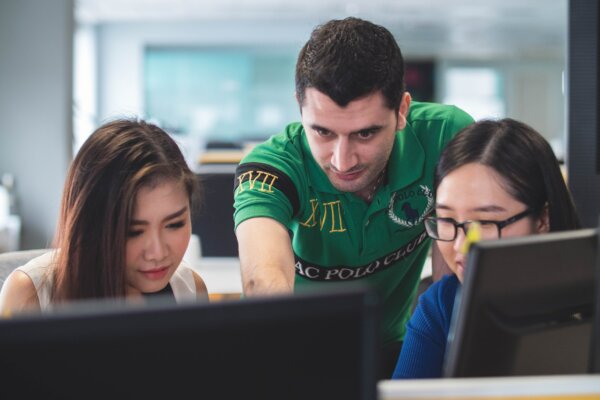 |
|
Transferable Skills |
|
What are they, how can you develop them, and how can they help in your healthcare career? |
|
 |
|
Lockdown Fatigue |
|
Lockdown fatigue - is it a 'thing'? |
|
 |
|
Looking After Yourself on Rural Placements |
|
Here are some resources to help you look after yourself better while on a rural placement. |
|
| |
|
Goulburn Valley Regional Training Hub News |
| |
|
Regional Medical Training Website: showcasing regional medical training pathways. Now covering 17 different regional locations in Victoria, New South Wales, South Australia and Tasmania, the Regional Medical Training website is helping medical students and junior doctors all over Australia to broaden their horizons when it comes to thinking about where to do their medical training. Created by an alliance of Regional Training Hubs, this easy to navigate site brings all the necessary information into one place. It provides medical students and trainees with the resources they need to discover specialty pathways, to find out about the regional training options available to them and to learn about how regional medical training can benefit their career as a health professional. www.regionalmedicaltraining.com.au
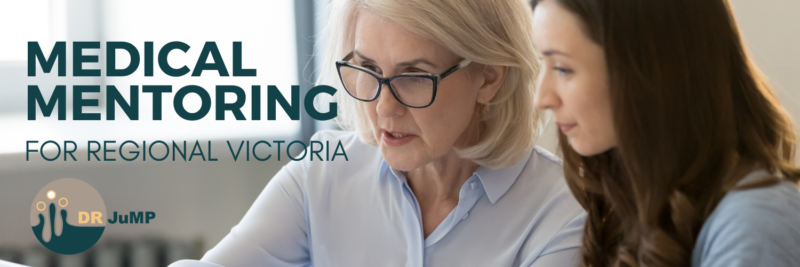 Dr JuMP is expanding across Regional Victoria. Are you trying to find a Medical Mentor? Or do you have some time to dedicate to guiding the next generation of Medical talent? Dr JuMP is a medical mentoring program specifically designed for the medical community in Regional Victoria. Please visit the website for further details on how to get involved. Dr JuMP is expanding across Regional Victoria. Are you trying to find a Medical Mentor? Or do you have some time to dedicate to guiding the next generation of Medical talent? Dr JuMP is a medical mentoring program specifically designed for the medical community in Regional Victoria. Please visit the website for further details on how to get involved.
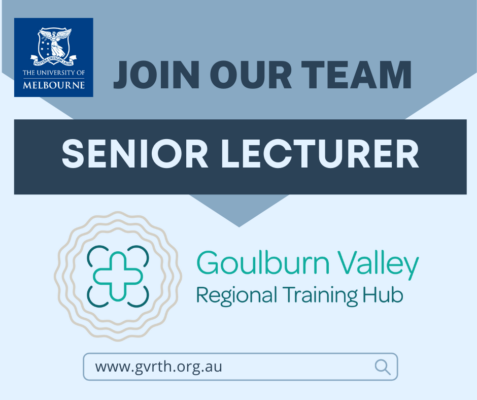
Join the GV Regional Training Hub. Are you a passionate educator or know of one? We are looking for a Senior Lecturer to join our team, who is keen to work within their rural professional community to grow medical training and opportunities that attract and retain the best practitioners. Further Info.
Upcoming North East Medical Networking Opportunities
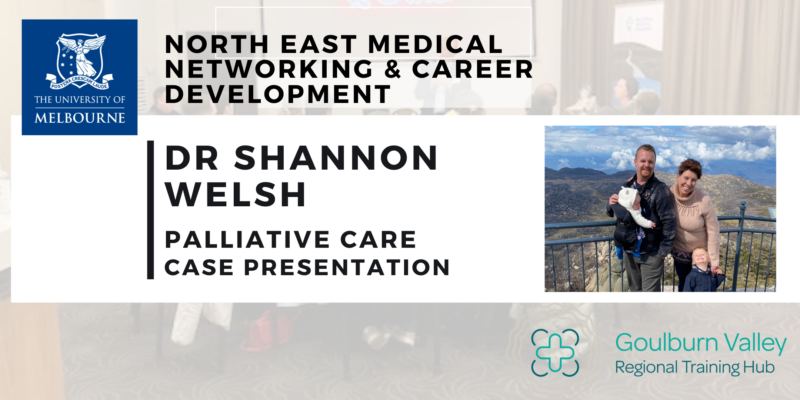
Tuesday 9th November – Yarrawonga. Dr Shannon Welsh will be presenting a Palliative Care Case Presentation at The Sebel in Yarrawonga on Tuesday 9th November at 6.30pm. This is a wonderful opportunity for Students, Interns, Registrars, Clinicians and Medical Professionals to network with those living and working in the North East. The case presentation by Shannon will also involve a panel of experts including Steve Pitman - Nurse Practitioner, and Mick Dobson - Occupational Therapist. Tickets can be purchased here: https://www.eventbrite.com.au/e/dr-shannon-welsh-palliative-care-case-presentation-tickets-193159283617 Medical Students can register for complimentary tickets.
Monday 29th November – Wangaratta. This event will feature a presentation by Mr Andrew Gogos on brain tumours, skull base surgery & nerve pain, at The Gateway Hotel in Wangaratta. Mr Andrew Gogos is a neurosurgeon and spine surgeon with a special interest in brain tumours and skull base surgery. Mr Gogos obtained fellowship of the Royal Australasia College of Surgeons after training in major neurosurgical centres across Australia. In 2019-20 he completed sub-specialist training in brain tumour and skull base surgery at the University of California, San Francisco, with training in the latest techniques including awake craniotomy, brain mapping, and minimally invasive endoscopic approaches. Registrations via this link: https://www.eventbrite.com.au/e/mr-andrew-gogos-north-east-networking-tickets-195640615347 Medical Students can register for complimentary tickets.
|
| |
|
Going Rural Health Education |
| |
Online Going Rural Health Education
The NEW Going Rural Health Learning Centre has been launched!
Going Rural Health have a new Learning Centre on the Going Rural Health website. Access the new Learning Centre HERE. Get on an have a look!
Participants will need to register for the website, log-in and enroll in courses. Certificates of completion will be automatically generated upon successful completion of courses. If you have any problems with this process please contact the team at going-ruralhealth@unimelb.edu.au
Courses will be added as they are released, but the site currently has 7 courses live:
- Online Introduction to Rural Practice: this is our updated course introducing students and new staff to practicing in a rural community. Great for those new to rural health. It is recommended for all students.
- Wellbeing and Resilience: an updated version of our Resilience module, the course has been moved to the Learning Centre for easier access. Health professionals - including health students - as a group don't tend to look after themselves well; this course gives insight and tips as to how to look after ourselves better.
- Giving and Receiving Effective Feedback: This is a combination of our original two separate courses (Giving Feedback, and Receiving Feedback), as much of the content was similar. Provides tips to better receive feedback, especially if it is negative, and ways to provide more effective feedback to staff and students.
- Communication: Tools to optimise your communication skills and ensure the perceived message is the intended message.
- Social Media Posting for Health Professionals. A package, particularly for young health students or experienced health professionals new to social media, that discusses the pitfalls and risks associated with social media posting on various platforms.
- Responding Effectively to Upset and Complaining Patients or Family. This course discusses methods to work with these individuals for best outcomes.
- NEW: Critical Thinking & Clinical Reasoning. This topic discusses what critical thinking is and how to implement into your everyday practice as a health practitioner.
Online Cultural Training - for Students ONLY
Going Rural Health, in collaboration with a Yorta Yorta traditional custodian from the Shepparton region, have developed an online cultural training course for students. The course can be accessed via our website HERE. |
| |
Education - November/December 2021
STAFF WORKSHOPS |
| |
|
**NEW** Introduction to Perioperative Nursing Short Course |
| |
|
Introduction to Perioperative Practice - Short Course
November-December 2021. More spaces now available! See image above for details.
To register for any staff workshops or courses, visit the booking system HERE. |
| |
|
Cultural Competency in Aboriginal Health Training
Ballarat (virtual): Workshop in two parts: Thursday 11th & Thursday 18th November, 9.15am-12.15pm both days. Students and staff welcome. See flyer HERE for more details. Bookings via Eventbrite HERE.
Wangaratta: STUDENTS ONLY - Tuesday 16th November 2021, 9.30am - 3.30pm. See flyer HERE for more details. Bookings via the link HERE.
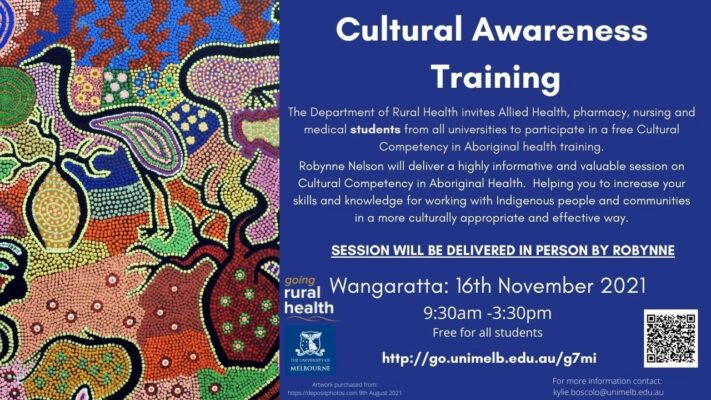
Please contact the education team via the Going Rural Health email address: going-ruralhealth@unimelb.edu.au for details of all education, if any issues with bookings, or to book a virtual session from the education list at Education topics. |
| |
New Interdisciplinary Graduate Education & Learning (NiGEL) Series
Going Rural Health introduced a new free education series for graduates and early career health professionals in 2021. This series was intended to support new graduates and early career professionals to develop their transferable skills and non-discipline-specific knowledge in health care.
After discussions with multiple health service staff, these sessions will be recorded and accessible soon via the Going Rural Health Learning Centre as part of a learning series (NIGEL Series). A discussion board will be made available to participants for some topics, to simulate the conversations which would normally occur in a live event. This will be monitored periodically by Going Rural Health staff.
For more information please contact:
Trish Thorpe trish.thorpe@unimelb.edu.au |
| |
University of Melbourne Nursing Courses
Dear Nursing Educators,
Applications are now open for the University of Melbourne’s specialty nursing Graduate Certificate programs.
Please nominate the nurses from your hospital that will be enrolling into the 2022 Summer intake to complete one of the nursing specialty Graduate Certificate courses listed below:
- Graduate Certificate in Critical Care Nursing (Emergency)
- Graduate Certificate in Critical Care Nursing (Intensive Care)
- Graduate Certificate in Critical Care Nursing (Integrated Critical Care)
- Graduate Certificate in Cancer Nursing
- Graduate Certificate in Neonatal Intensive Care
- Graduate Certificate in Nursing Practice (Paediatrics)
- Graduate Certificate in Nursing Practice (Paediatric Intensive Care)
The nomination form is HERE for your completion. Please email the completed form to Nursing-Programs@unimelb.edu.au by 1 November 2021.
Once you send back the nomination form, the nominees will be emailed instructions on how to apply. The instructions will include the Student Support contact details should the nominee need further assistance with their application.
If you have any questions, please don’t hesitate to let us know.
Kind regards,
Nursing Project team |
| |
External Education & Resources | |
Vision Initiative - Community Health Training
The Vision Initiative is presenting an Eye Health Webinar to Health Services.
By doing this training, staff will gain the skills of identifying eye problems and knowing when to refer the people they support to see a GP or optometrist. 90% of vision loss can be prevented or treated with early detection, and the Vision Initiative wants to give health services the opportunity to optimise people’s eye health, which otherwise would result in vision loss and secondary health impacts.
When: Wednesday 17th November 2021, 4-5.30pm
Register: To gain access to the zoom link, please purchase a free ticket via the link for your location on the flyer here: Regional Wide Community Health Training Modules - eye health
Paediatric Condition Overview & Referral Criteria (RCH)
Each presentation will provide you with a brief overview of the condition as well as the key referral criteria to the Royal Children's Hospital.
Dysphagia
Wednesday 10th November, 1-1.30pm
Presenter: Ursula Sevil, Speech Pathologist RCH
Register HERE.
Weight Management, Feeding Difficulties, Home Enteral Nutrition & General Out-patients
Tuesday 23rd November, 1-2pm
Presenter: Rachael Martin, Dietitian, Nutrition Department RCH
Register HERE.
Foot Orthosis and AFOs
Thursday 2nd December, 1-2pm
Presenter: Nicole Galea & Simon Lalor, Orthotic & Prosthetic Unit, RCH
Register HERE. |
| |
Free Student Resource From CRANA plus:
Adapting Self-Care Practices During Clinical Placement
The resource is for any student preparing for a placement in a rural or remote setting. To access the resource, visit the webpage HERE.
Allied Health Clinical Educators Network Clinical Supervision Modules
The Allied Health Clinical Educators’ Network (AHCEN), has released some modules on training staff in clinical supervision. They include:
- Setting up a clinical supervision relationship
- Providing effective feedback
- Developing Clinical Reasoning through Supervision
- Supporting Wellbeing through Clinical Supervision
For more details see the document HERE.
Allied Health Paediatric Videoconference Series 2021
NOVEMBER: Monday 8th November 2021, 1-2pm.
Topic: Caring for Conversions - How the care factor can impact on Conversion Disorder recovery. Presented by Chiara Tewierik - Physiotherapist, Physiotherapy Department.
Book via the link HERE.
DECEMBER: Thursday 9th November 2021, 1-2pm.
Topic: Autism Spectrum Disorder - what to look for and what to do. Presented by Presented by Sonia Marson - Speech Pathologist, Allied Health and Mental Health Departments
Book via the link HERE.
Head to Help: A Free Mental Health Service For All Victorians
This is a service available through the Primary Health Network (PHN), for Victorians of any age experiencing mental ill-health - whether they have a GP mental health plan or not. The service is FREE, and no appointments are required.
Phone: 1800 595 212 8.30am - 5pm Monday to Friday (except public holidays).
For more details see the website HERE.
NOTE: This is NOT a crisis service.
For urgent support call Lifeline on 13 11 14
Out of hours and weekends call Beyond Blue on 1800 512 348.
Yarning SafeNStrong - A New Counselling Service for Aboriginal & Torres Strait Islander Peoples
The Victorian Aboriginal Health Service has established Yarning SafeNStrong: a free and confidential counselling service for Aboriginal & Torres Strait Islander Peoples. The service is available 24 hours, 7 days a week to people and families who need to have a yarn with someone about their wellbeing.
Phone: 1800 959 563
For more information see the website HERE.
Three Rivers UDRH
Three Rivers UDRH supports health professionals, staff and students by offering free online courses. The following two courses are especially relevant:
Three Rivers UDRH Rural Clinical Placements – How to grow your own course .
Three Rivers UDRH Telehealth - Embracing Technology in Healthcare
Student telehealth placements resource
There is a great resource available from SARRAH about student telehealth placements. It is a copy of the presentation from a recent webinar. Access it via the link below:
SARRAH webinar student TH placements Robyn Gill
PHN resources
WestVic PHN and Murray PHN also have education available in regional and rural areas. See their websites for details of what is on in your region:
WestVic PHN: https://westvicphn.com.au/events-education/upcoming-events/
Murray PHN: https://www.murrayphn.org.au/events/ |
| |
7th Community Pharmacy Agreement Program Updates
The 7CPA is now up and running. There are a few changes to running of funded programs. Rural support programs are available via Pharmacy Programs Administrator. Check your eligibility.
Did you know that many pharmacy programs have changed their definition or regional and rural?
The model being used has moved from PhARIA to Modified Monash. This means that many communities that were previously ineligible, now have funding opportunities. Under the PhARIA scheme Traralgon was a category 1, Under Modified Monash it has moved to a category 3. Rural funding starts at MM3 to MM7.
To check where your community fits follow this link.
Changes to Closing the Gap
There have been recent changes to Closing the Gap (Aboriginal and Torres Strait Islander funding) program under the 7th Community Pharmacy Agreement.
Under the new system doctors no longer have to provide CTG on prescriptions.
From 1 July 2021, the following changes have come into effect:
- A new centralised patient registration database for the program, managed by Services Australia, will go live. Current registration details will be transferred to the new database.
- Any PBS prescriber or Aboriginal and Torres Strait Islander Health Practitioner registered with Medicare as a provider can register eligible Aboriginal and Torres Strait Islander people for the program, via Health Professional Online Services (HPOS) if they are not already registered.
- PBS prescribers will no longer be legally required to write or electronically print ‘CTG’ on eligible PBS prescriptions for registered Aboriginal and Torres Strait Islander people. However, annotation of a PBS prescription will help community pharmacists, when dispensing the medicines, know that the patient is registered for the program.
- If Aboriginal and Torres Strait Islander people are registered for the program the PBS Online claiming system will verify this in real time. If the “Closing The Gap’ field in the dispensing system has been completed, this will trigger the correct pricing and the claim will be processed. If that field has not been completed, a claim will be rejected and will need to be resubmitted.
- Pharmacists will be able to confirm if Aboriginal or Torres Strait Islander people are registered for the program via HPOS.
- New reason codes will be provided for PBS claiming which will also indicate to a pharmacist whether or not Aboriginal and Torres Strait Islander people are registered for the program whilst dispensing a PBS General Schedule prescription.
- General Schedule PBS prescriptions issued by public hospital prescribers will now be eligible under the program when dispensed by a community pharmacy or Section 94 Approved Private Hospital Pharmacy.
For more information go to: https://www.pbs.gov.au/info/publication/factsheets/closing-the-gap-pbs-co-payment-measure
Active ingredient prescribing
As of the 31st July 2021 computer generated scripts are required to be written as the active ingredient. This is causing great confusion for patients/customers as many have relied on the brand name to determine what medication they need to collect.
This is a fantastic health literacy opportunity for pharmacists.
There are constant concerns of double dosing medicines with changes of brand names. This concern has been further heightened over the last few years with more and more out of stock issues and price disclosure forcing brand changes for patients. We have box updates and attending multiple pharmacies (for convenience or due to lock-down travel restrictions).
The work flow on the dispensing end does not change and there are no changes with PBS claiming in terms of changes to active ingredient prescribing.
There is an exclusion list of items available from the link below. In the list includes many occular lubricants, iron preparations, baby formulas, dermatological preparations such as skin therapy oils, and products containing four or more active ingredients.
For more information go to: https://www.pbs.gov.au/info/general/active-ingredient-prescribing |
| |
Going Rural Health & UDRH Research | |
|
The Going Rural Health program sits within the University Department of Rural Health (UDRH) of The University of Melbourne. The UDRH undertakes a number of research projects, some of which relate to student placements - from both the student perspective, and of those who support students (supervisors and placement support staff).
Student Placement Survey
As previously mentioned, Going Rural Health are trying to ensure that students get the best placement experience possible. Please help us to do this by directing students to complete our Student Placement Survey. It is a short online survey that should only take students 10-15 minutes to complete.
Supervisor & Placement Support Staff Survey
Going Rural Health are undertaking a research project to gain a better understanding of rural clinical placements, from the perspective of those who support students (supervisors and placement support staff). Many of you will have already received an email from one of the Going Rural Health team members to invite you to participate, and to encourage you to share the invite with your colleagues. Visit the Going Rural Health webpage HERE for more details.
If you would like any further information on any of these projects, please contact the Going Rural Health team at going-ruralhealth@unimelb.edu.au . |
| |
Going Rural Health Website | |
|
www.goingruralhealth.com.au
All our resources for students and staff/supervisors can still be found in the student or staff menus. Please feel free to contact us at going-ruralhealth@unimelb.edu.au if you have any items to add or queries regarding content.
The website has a new videos page, that contains all videos relevant to student rural placements. Find the new page HERE. |
| |
|
The University of Melbourne Department of Rural Health acknowledges the financial support provided by the Australian Government, through the Rural Health Multidisciplinary Training program, for the Going Rural Health program.
We acknowledge the traditional custodians of the lands on which our campuses are located, pay respect to Elders past, present and emerging, and extend that respect to all Indigenous Australians. |
| |
|